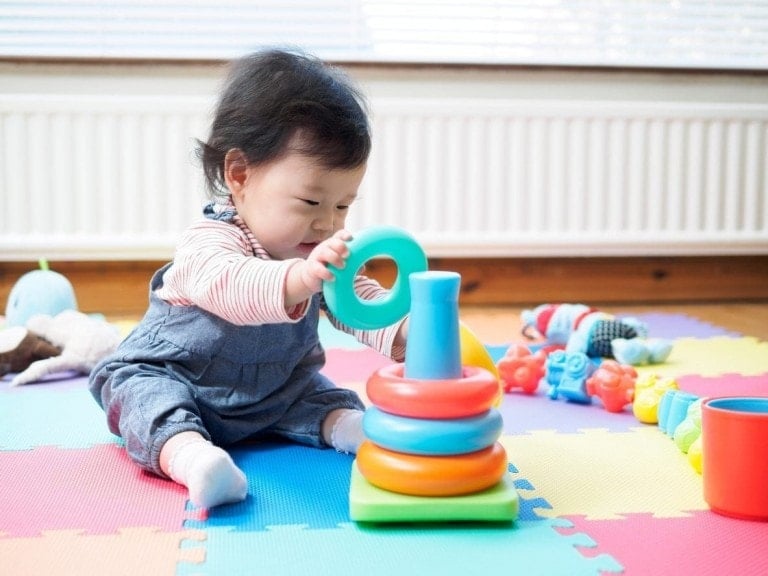Navigating the world of parenting can be hard enough as it is. Then you’re hit with the development questionnaire at your child’s pediatrician visit, and suddenly you’re filled with more questions.
What do these items on the developmental screening even mean? How do I know if my baby is on track with developmental milestones? What does Google have to say about this? Is this normal for my child’s age? As a mother, a physical therapist specializing in pediatrics, and Movement Expert for Enfamil, I’m here to answer questions like these. Read on to learn about the signs of developmental delay in children that you, as the parent, can pick up on to help inform your child’s doctor about their abilities.
What Is Developmental Delay?
First, let’s define developmental delay. The term is used when a child has not met the developmental milestones expected for their current age.1 It’s important to remember that if your child was born prematurely (before 37 weeks), we need to adjust their age when looking at expected milestones. Delays can occur in any area, including:2
- Speech and language
- Fine and gross motor function
- Cognitive development
- Play
- Self-help
- Social skills
If you suspect your child might be delayed in one or more areas, a formal evaluation will help determine their exact needs.
What Causes Developmental Delays?
Various things can contribute to developmental delays, including prematurity, genetic conditions, neurologic conditions, and other medical diagnoses. Often, the cause of the delay is unknown. It’s critical to work with your child’s healthcare providers to determine if an underlying condition is impacting your child’s development, as it may influence the best course of treatment for them. Doctors and therapists use evidence-based screening and assessment tools to help identify children falling behind in one or more areas of development. Research has shown that the earlier we can identify developmental delays and refer them to the appropriate providers, the better the outcomes are for that child. The brain is most adaptable and able to create new connections in the first three years of a child’s life. This is a critical time frame to intervene and give children the best chances for good outcomes in the future.3,4,5
Developmental Delay Signs to Watch For
Since we know that early intervention is key to improving outcomes, it can be helpful for your child’s doctor to get insight into their development from the parent. You are the ultimate expert when it comes to your child. It can be helpful to keep notes and questions about your child’s development and bring them to your next doctor’s visit. The following are some signs of delays in the realm of motor development that you can watch for that could warrant a chat with your pediatrician.6
- A plateau in your child’s development. Has your child gone a month or more without gaining any new skills? (Remember, even mini-milestones count!)
- They use one side of their body more often or differently.
- They have difficulty holding their head up during tummy time at three months.
- They do not show interest in toys or manipulating items with their hands at four months and up.
- They are not sitting up by nine months.
- They have stiffness in their arms and legs.
- They have a floppy or loose-feeling trunk and limbs.
- They do not bear weight through their legs or stand up by 12 months.
- They are not walking by 18 months.
- They are walking primarily on their tip toes after two years old.
- For preschoolers or school-age children, watch for clumsiness, difficulty keeping up with their peers, or a lack of coordination.
What’s Next?
Talk to Your Doctor
Remember that every child is different, and it’s important to recognize everything your child CAN do and the things they might be struggling with. What is normal for one child may not be typical for another. If you notice any of these signs of developmental delay in your children listed above, the first step is to talk with your child’s pediatrician. Don’t hesitate to be persistent or advocate for referrals if you have concerns. In most instances, you can even seek out developmental evaluations for your child without a doctor’s referral.
Do Your Research
Every state in the U.S. has a state-funded early intervention program that offers free or low-cost developmental services for children from birth to age three. Families can self-refer to this federally mandated program. Other options for assistance in your area may include private clinics, hospital-based programs, home health agencies, and more. Services are available through the public school system for children older than three.
Take a Breath
It may seem scary or overwhelming to get your child evaluated by a physical therapist, occupational therapist, behavioral therapist, or speech therapist. Still, you will gain invaluable insight into your child’s specific strengths and needs. Remember, your child is perfect no matter where they fall on the development spectrum. Early intervention for developmental delays will give them the support they need to truly thrive along their unique developmental journey.































